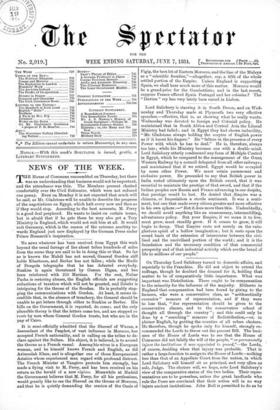On Thursday Lord Salisbury turned to domestic affairs, and especially
to the Franchise. He did not object to extend the suffrage, though he doubted the demand for it, holding that matter to be of comparatively little importance. What was important was Distribution. There ought to be compensation to the minority for the influence of the majority. Hitherto in England that compensation had been found by giving to the farmers, who were a conservative class, an "arithmetically excessive" measure of representation, and if they were to lose that, "due representation should be given to the conservative classes, and to the conservative school of thought all through the country " ; and this could only be done by a " searching " measure of Redistribution,—or, in plainer English, by gutting the counties of all urban electors. He therefore, though he spoke only for himself, strongly re- commended the Lords to throw out the present Bill. The busi- ness of the House of Lords was to see that the House of Commons did not falsify the will of the people, " orpermanemay injure the institutions it was appointed to guard,"—the Lords, of course, deciding when that injury was probable. That is rather a large function to assign to the House of Lords—nothing less than that of an Appellate Court from the nation, in which Lord Salisbury will himself sit as principal, and very often as sole, Judge. The electors will, we hope, note Lord Salisbury's view of the comparative status of the two bodies. Their repre- sentatives are to be powerless, unless the great landlords who rule the Peers are convinced that their action will in no way injure ancient institutions. John Bull is permitted to do as he
likes with his house, provided he alters nothing, except possibly the kitchen range and the scraper at the door.















































 Previous page
Previous page